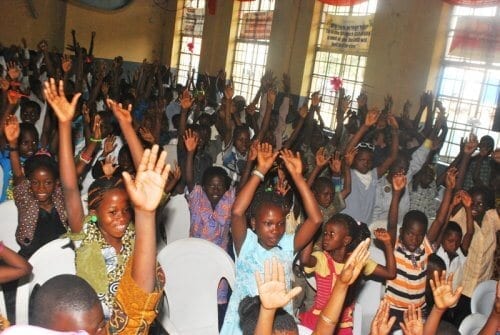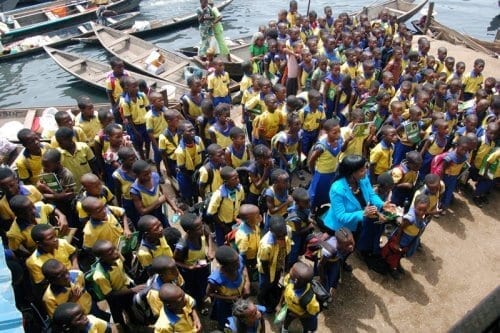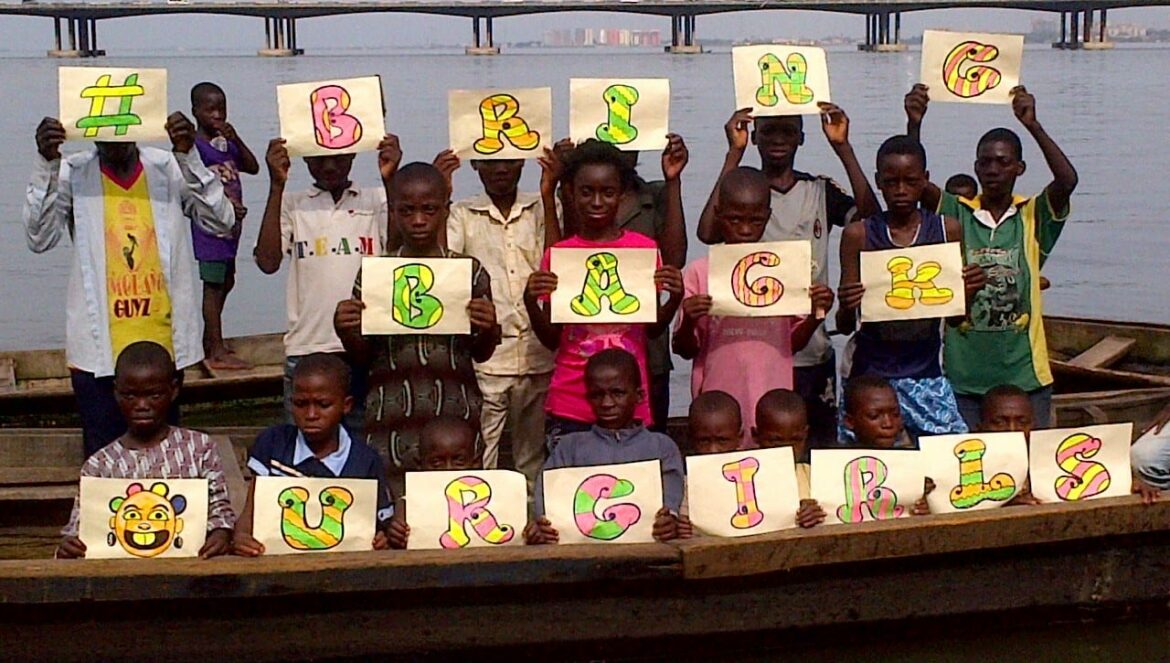As part of an international series on education, edCircuit poses questions to Betty Abah, Executive Director of CEE-HOPE, an organization bringing resources and hope to thousands of disadvantaged children in Nigeria. Abah answers in erudite fashion, how a neglectful political regime can destroy not only the educational structure of a country but the very livelihood of a generation. Abah describes the rewarding efforts of helping young women who have suffered neglect, become educated, and lift themselves up out of the poverty spiral. As Abah explains, much more needs to be done to “pound the conscience of our passive government to make Nigeria more child-friendly and education more accessible.”
Interview:
edCircuit: For those outside of Nigeria can you share with us the scope of the challenges children are facing in your country and how education, currently, is viewed by the government?
Betty Abah: Sadly, these are not the best of times for Nigerian children. Nigeria currently occupies an unenviable place as having the highest number of out-of-school children globally, according to UNESCO (about 11 million). However, nothing in government policy, body language or initiative, either at the Federal or State level has shown any serious response to this embarrassing status. A recent announcement by the Federal Government to provide free meals for pupils nationwide appears highly faulted by some of us, as the meal contemplated is only chaffy biscuits, when there are local alternatives such as moi-moi and akara (bean cake) that are much more nutritious and filling. I do not think it is sincere, but rather, a half-hearted tokenism.
Sometime in 2013, the Safe Schools Initiative, targeting at school-age children in Northern Nigeria (which has the highest burden of out-of-school kids), was initiated by former British Prime Minister and UN Special Envoy for Global Education, Gordon Brown. It was aimed at safeguarding schools in light of the terrorist attacks on schools by Boko Haram, and sustaining school enrolment. At separate times, N10 Million and another $500 Million (counterpart funding) were secured to fund education. It’s difficult to ascertain if that was properly administered in the long run because the rates of school drop-outs are still very high, especially for girls with implications for early marriages, teenage pregnancies, and all other debilitating ends.
In all, for me, the response has not been encouraging. We hope that the little we do (even if it’s a tiny drop in a mighty ocean), alongside many other private entities, will add up and make a difference for the destitute and those on the fringe of society where we work.
Our government still needs to get beyond empty rhetoric and tokenism and reach out to those truly in need of help. So far, we have had no form of assistance or collaboration with government, and that’s the same for many non-profits trying to make a difference in the lives of the urban poor and other impoverished and neglected populations. Accountability and commitment are major issues we contend with and that hamper progress.
One of the things we have campaigned against in recent years, for instance, is the absolute lack of a structured social welfare system for children by successive governments at various levels. It has made many families especially the ultra-poor, cling to thin threads of survival and not even consider education as an option. This neglect has helped groom a generation we call the “children of anger.”
Many feel the government and society are not obligated to them, that they are criminalized, and thus are naturally not obligated to government and the society in any way. They tend to unleash terror on the society as a way of venting their anger and resentment. As a result, you see extremism, militancy and all sorts of criminality breeding in several parts of the country. The government, which should have prevented such acts all along by investing in, listening to and grooming the citizens from a young and impressionable age, have responded with force and sometimes unnecessary aggression which results in collateral damage. Many of our problems stem from the government not doing its job properly by engaging, nurturing, and providing for generations which should have become assets. The government has failed to take life-enhancing, illuminating education seriously.
The greatest problems facing millions of Nigerian children is poverty, the lack of access to basic amenities of life, and quality education, or even education of any quality. The current recession in the country (the worst in 29 years, according to official figures), offers even bleaker prospects. Our government, for which education has never been a top priority, will use the recession as a convenient excuse to allow things to get even worse, especially regarding school enrollment, retention, and provision of essential educational amenities. There are private schools with relatively higher quality education, but they are priced out of reach of the poor which constitute the majority of the citizenry.
edC: When you established CEE-HOPE, three years ago, what initially compelled you to start this work and what was the response from the community?
BA: Makoko community in Lagos, which is reputedly Nigeria’s largest slum, is the first community in which we started work. The relationship began more or less accidentally. Sometime in 2012, I read on Facebook that the Lagos State Government was about to demolish the community of 80,000 residents, with a 48-hour notice, without any form of resettlement and rehabilitation. It was utterly inconceivable. As a human rights activist and a journalist, I ventured into the community. I had heard about the unique setting; a basic fishing community whose houses, made of wooden stilts, are built over water. Every activity revolves around water, from kids going back and forth to school on canoes to women selling wares from house to house, by paddling their canoes from wooden doorpost to wooden doorposts. I went and tried to get information and mobilize, in my capacity, some form of public opinion and opposition against the demolition. Many people were against such an act of inhumanity and all our collective voices of anger generated a groundswell of opposition against the attempted forced eviction.
I also visited a part of the community that had already undergone demolition, consulting, and witnessing a sheer humanitarian crisis. Kids were thrown into the water by the rampaging demolition squad sent in there by the Lagos State Government. Families were displaced and taking refuge in church buildings and several other decrepit abodes. My organization (the Environmental Rights Action, at the time) was able to send in some badly needed relief, and we continued the campaign. I felt a special connection to the community. I was especially drawn to the children; so many out of school and living in unspeakable squalor.
Makoko was made up of fishing folks, timber traders and others from the Niger Delta and immigrants from the Benin Republic, Togo. It was highly segregated, and they lived like indigenous entities. Schools were a rarity and mostly French-speaking schools in a country whose official language is 100% English; there was absolutely no government presence. It was all just unimaginable because it was right at the center of Lagos, Nigeria’s most cosmopolitan city. I was deeply affected by the reality of the marginalization of the urban poor and the reality of a doomed future hanging over children’s lives. I knew education was the major thing that could make a change for these endangered futures. Though some NGOs were working there, not many addressed the critical aspect of education, and I decided to do something about it.Er hsb
Before then, I had always worked with children. I remember starting a children’s club in my neighborhood at age 14 and as a teenager, an all-girl club at age 18, both back home in Benue. I was always involved with children and young people over the years, but not really in a structured manner. It doesn’t take the world to change these children’s world, and they could become the game changers of the world of tomorrow. Only a little touch of compassion, a little investment in education and time dedicated to shaping their thinking in a positive direction could make a difference.
We took off in December 2013 with a gathering of 700 children from seven slums across Lagos, and that was how CEE-HOPE was born – to inspire HOPE in the forgotten children of Nigeria. We established the Harbingers of Hope Scholarship program, the Hope Ambassadors program for orientation and the very vibrant Girls-Go-For-Greatness (‘Triple G’) Club, which works with teenage mothers and other vulnerable girls in the communities, providing educational scholarships, skills training, girl leadership and mentorship training. What started in Makoko, Lagos is spreading fast to other communities and states.
It’s very challenging, but it’s been thrilling all along, reaching out to several hundreds of disadvantaged, orphaned children and disillusioned young girls and young women across Lagos, Ogun and Plateau States. There are more states in our view.
 The response from beneficiaries has been encouraging. I have seen parents shed tears over the prospects for their children through our programs. I have had rounds of consultations with revered chiefs (traditional leaders) from across the communities, and they are happy and grateful. I think I am popular with them because they see my team and me more frequently than the politicians who only come around once every four years to rivet them with promises they never intend to keep. The politicians drop a few bags of money and take their votes away!
The response from beneficiaries has been encouraging. I have seen parents shed tears over the prospects for their children through our programs. I have had rounds of consultations with revered chiefs (traditional leaders) from across the communities, and they are happy and grateful. I think I am popular with them because they see my team and me more frequently than the politicians who only come around once every four years to rivet them with promises they never intend to keep. The politicians drop a few bags of money and take their votes away!
I am excited, although occasionally depressed, wishing things were at a larger scale, wishing we had bigger resources because of the needs, but I believe things will get better. One thing that inspires and goads me on is the support and trust of supporters that we enjoy. I sense that when you have genuine motives, it shines forth from within you. Most of our work in the three states have been through the support of individuals, most of whom, do not know me in person, and many are through social media. For instance, we have an octogenarian from Massachusetts, USA whom I have not met yet but is inspired by our work with the girls. The sponsor supports us every year with a token and craves for anonymity. The support shows that our work is appreciated and no matter the current constraints, I will keep at it. I truly SEE HOPE!
edC: I would imagine that you might feel a sense of community with the young people you are helping. How has your journey impacted the work you do?
BA: I virtually sleep in many of these communities especially around Lagos with the peculiar throng of marginalized humanity. It’s an indescribable feeling being surrounded by these kids, these girls that look up to you so passionately.
I wasn’t born with a silver spoon even though our house wasn’t a contraption of wooden stilt over the Lagos lagoon. The environment back in my home state of Benue State, North Central Nigeria was such that I could have also fallen victim to the vicious traps that hover over the heads of any child born and raised in ultra or ‘mid-level’ poverty. A few of the factors that made a difference in my case were; I strived to get a good education, read widely and developed myself. I also had strong external, positive influences in the form of mentors who took an interest in me quite early in life. I had Sunday School teachers who through children’s club activities, helped shaped my mind and instil in me a good sense of value. I think positive exposures go a very long way in the lives of children because they are very impressionable. In the last three years, I have seen those realities demonstrated in the lives of the hundreds of children and young people with whom we work.
Seeing a cousin raised by my mother regress into poverty and seeing how her overall stunted progress as a result of teenage pregnancy spurred me to work with girls suffering from high incidences in our communities. Our work in rehabilitation and girl’s education has been very rewarding. We have seen amazing transformations!
edC: When readers, outside of Nigeria, lay their head down to sleep tonight, what is the lasting message or image you would like them to have regarding the children of Nigeria?
BA: I would like for them to think of our children as those with great potential but most of whom will never realize their potential due to a dysfunctional system. We have Nigerians outside the country doing marvellously well in most fields of endeavor because they find themselves mostly in environments that are conducive and encouraging of their skills and potentials.
With the support of the media pounding the conscience of our passive government, to make Nigeria more child-friendly, we can make education more accessible. I think we can make progress.
For now, we are not near progress and Nigerian children remain an endangered species. It is the haunting image I live with sadly, and would like others to see, and be touched.
edC: Where can people go to learn more about your work and support that CEE-HOPE may need to further the mission?
BA: We are just a click away via our website: www.cee-hope.org. Our emails are ceehopeng@gmail.com and ceehope.nigeria@yahoo.com, and our contact number is +234 703 203 8897.
We are also on social media: Facebook (CEE-HOPE Nigeria), Google Plus and Twitter (@ceehopenigeria).
Betty Abah is the Executive Director of the Centre for Children’s Health Education, Orientation and Protection (CEE-HOPE) and founder of the successful, Girls-Go-For-Greatness (Triple G) program. Abah is a journalist, in addition to being a women and children’s rights activist. She is a graduate of the University of Calabar (BA) and the University of Lagos (MA) and previously practiced as a journalist both in Nigeria and the USA (as a recipient of the Alfred Friendly Press Fellowships in 2006). Betty Abah has been a fellow of the Knight Journalism Press Fellowship, the Kaiser Family HIV/AIDS Fellowship, the Global Tobacco Control Leadership Program at the Hopkins School of Public Health (USA), and has been awarded the Nigeria Media Merit Awards for Tourism Reporter of the Year, the Diamond Award for Media Excellence (‘Child-Friendly Reporter of the Year’), the NYSC’s State’s Honours Award (for community mobilization), and last year, Women of the World Unite (USA) among others. Abah enjoys writing and has published several books, including poetry.
Subscribe to edCircuit to stay up to date on all of our shows, podcasts, news, and thought leadership articles.





